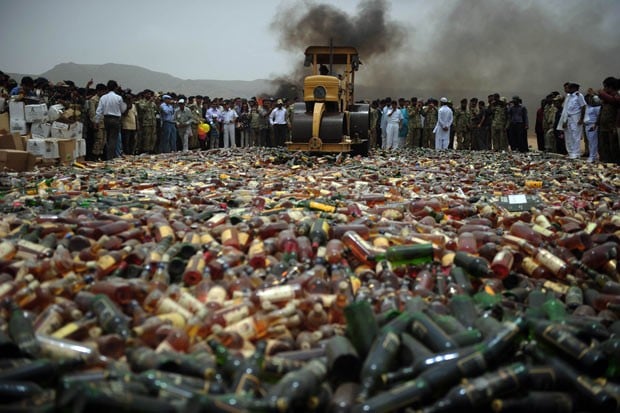
The alcohol has allowed numerous bootleggers to venture into ‘business

During the twilight hours of the first day of 2018 I was engrossed in reading a book, seated in front of the fireplace in the tv lounge and savouring a cigar as is my ‘custom’ for the New Year. The tv was on mute. Suddenly, images of ‘breaking news’ started flashing on the screen. I turned up the volume. A car had reportedly smashed into a police check post around midnight, injuring one constable and killing another. Some blamed alcohol, others the fog.
The electronic and social media came out with their usual, high-pitched and frenzied statements, passing judgements without waiting for a court verdict, and stamping on the most basic human right: everyone is innocent until proven otherwise.
At this moment, my mind drifted back to one particular evening at the Lahore Gymkhana Club where we, a bunch of university friends, were discussing alcohol use. Dozens of people in the city lose their lives or are badly injured every year due to the (alleged) consumption of alcohol. Then there are those who are poisoned and, in most cases, fatally, after consuming the local moonshine.
During the discussion, some of us were for a rigid implementation of the prevailing carpet ban on alcohol, while others were of the opinion that its sale and consumption should be allowed albeit with limitations. It might be important to quote the example of the era of Prohibition in the United States (in the 1920s and early ‘30s) when a complete ban was slapped on the consumption and sale of alcohol. This resulted not only in the drink being consumed in even greater quantities than before because it seemed more ‘attractive’ after the ban, but it also allowed various branches of the American mafia to strengthen their roots by tapping into yet another illegal business venture, minting millions of dollars thanks to the soaring prices of alcohol. Lahore faces a similar problem, albeit of different dimensions.
The ban in place regarding alcohol has allowed numerous bootleggers to venture into ‘business’ and carry out their activities discreetly, usually over the phone. This creates an additional law and order problem, i.e the growing strength of the bootlegging mafia. Along with that it provides opportunities to certain corrupt officials in the law enforcement agencies who allegedly take bribes and let the bootleggers and their customers off the hook. A strictly regulated product would provide far less opportunities of corruption than a completely banned one with an ultra-high demand.
Besides, since there is a complete ban on the sale and consumption of alcohol instead of the product being regulated, the government loses millions in taxes every year. If these taxes were collected they could be used to improve the deteriorating infrastructure and delivery of the education and health sectors in Lahore.
Lahore’s society is sharply divided between liberals, conservatives, and the younger generation that moderately accepts difference of opinion. Therefore, when I try to think of a viable solution that is pragmatic and additionally caters to the social temperature of my city, lifting of the carpet ban does not seem like a suitable solution.
Similarly, a rigid ban may not be realistic when seen with the lens of implementation on the ground level.
A solution to this may be offered in the form of moderation of both extremes, keeping in view the general tilt of our society. The final structure of such a policy solution must come from those that I and others from Lahore have endeavoured to elect and consequently pay for their salaries. I look to the men and women sitting in the corridors of power to bring us a viable yet practical solution so that priceless human lives of my fellow countrymen and countrywomen may be saved.